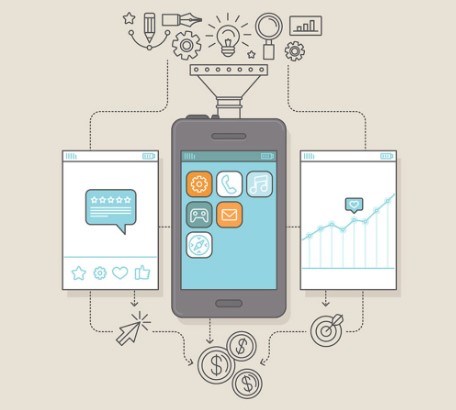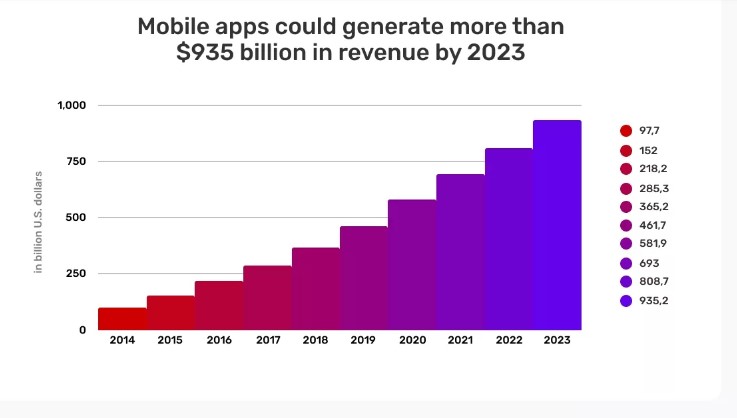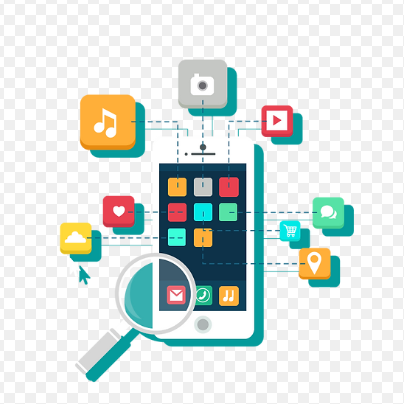When launching an app, make sure you thoroughly test its monetization. Only well-tested products and apps will offer you the push you need to increase your business.
Apart from updating app features and general UI, it’s critical to concentrate on the app’s revenue generator – the paywall. When a user sees the paywall for the first time, they make an 80% purchase.
While most entrepreneurs want to have mobile app development company NYC to automate their internal and external business activities, not all of them know how to monetize apps.
According to Serpwatch, mobile apps are expected to earn $935 billion in revenue in 2023, up from $693 billion in 2021 and $365 billion in 2018.
These statistics show that the mobile app market is massive and continually increasing. This post will list the best mobile app monetization strategies to help you get a piece of this massive industry.
What is Mobile App Monetization?
Mobile app monetization is the process of making cash from any mobile application. App monetization can take several forms, including displaying adverts, offering in-app purchases, selling user data and charging users for premium capabilities. App monetization can assist app owners in covering their expenditures and earning profits.
Why is App Monetization Important?
App owners must build long-term, lucrative enterprises. App monetization helps in generating revenue from a mobile app to help in achieving ROI. In-app deals, advertising, subscriptions, sponsorships, and partnerships are all ways to monetize your mobile app. You can increase app user retention, loyalty and engagement while also ensuring app income potential by choosing the correct mobile app monetization strategy.
Top 10 Mobile App Monetization Strategies:
- In-App Advertising
In-app advertising is another option for monetizing mobile apps that do not require you to charge your app users upfront. It enables you to display advertising from third-party networks or your inventory within your app and earn cash when users view or engage with them.
In-app advertising can be integrated into a wide range of apps, including social media, gaming, broadcast and news, and other forms of media. You may optimize the user experience and ad performance by changing the type and location of advertising. In-app advertising forms that are commonly used include rewarded videos, banners, native ads, playable ads and interstitials.
- Freemium Subscription
Freemium is an app monetization technique that divides the functionality of the application into two parts: free and paid apps. Free users have limited access to functions, but premium users have total access. This method lowers the entry barrier and allows anyone to benefit from your products.
If people like your solution, they can pay a monthly charge for additional services instead of investing in something new and unknown. Paid app features may include better functionality and upgrades, monthly credits, full-fledged support, unlimited storage space, and others.
- Premium Subscriptions
A premium subscription monetizes your app by giving consumers who pay one-time or recurring fees access to premium features or content. This mobile app revenue model will assist you in generating consistent and predictable profits from your engaged and loyal customers.
- In-app Purchases
In-app purchases are another common strategy of app monetization. This method enables app developers to earn money by selling virtual objects and services within the app’s functionality. In-app purchases are a feasible approach to monetize mobile solutions across industries, from physically acquiring in-app currency to unlocking extra mobile app capabilities.
- Partnership and sponsorship
You can also profit from sponsorship and a partnership mobile app income model. This implies you cooperate with other brands or businesses that share your target demographic and provide them with incentives in exchange for their support. For example, you can display the company’s logo or banner on the app or promote their products or services to your users. Some apps can also contain their features or content.
- Email Marketing
Email marketing is still one of the most effective monetization strategies for applications and beyond. The great majority of internet users still communicate primarily via email. Mobile app development nyc companies frequently acquire customer email accounts in order to send out reminders, bills, newsletters, and significant notifications. This type of monetization technique, when combined with personalized suggestions, can produce excellent results.
- Affiliate Marketing
Affiliate marketing is a common way to monetize your app. It is performed by promoting relevant to your target audience products or services from other companies and service providers. You can generate app revenue on a daily basis by collecting commissions on each sale or activity generated by your app. If your app is about fitness, for example, you can partner with online stores or fitness brands that offer affiliate programs and display their advertisements or links on your app.
- Referral Marketing
Using your existing users to promote your app to their friends, family, or contacts is the main focus of this mobile app company income plan. Through incentives such as discounts, awards, or free features, customers might be encouraged to share the app with others who may be interested in the subject or content.
- Licensing
For systems that mix massive volumes of user-generated data, licensing is an appropriate mobile app monetization option. This data can be utilized to develop new tools and apps. However, collecting and selling user data necessitates express user permission as well as approval from app stores such as Google Play and Apple Store.
- Pay Per Download
You charge consumers a predetermined cost to download the app from the store in this revenue-generating technique. The money you produce is determined by the number of customers willing to pay for your software and how you price it.
Conclusion
Even before the process of mobile app development is completed successfully, mobile app monetization is a critical stage. It takes careful preparation and execution, and numerous criteria, such as target demographic, app features, user experience, and market competitiveness, are considered when developing the optimal app monetization strategy. You may create income, gain profit, and sustain your app’s growth and success by choosing the most appropriate and successful monetization model for your app.


